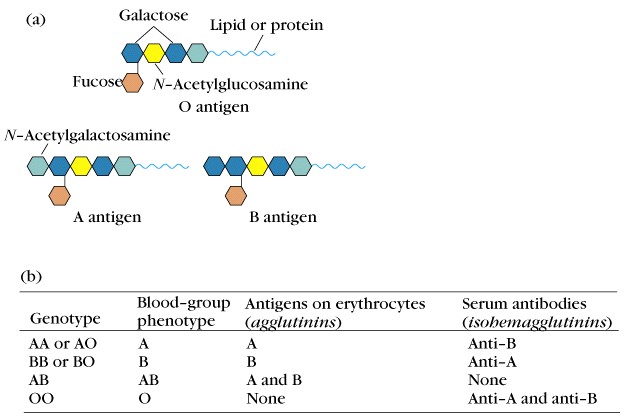This is a very interesting question, I never thought about it before really.
Now, from what I could gather, and from what I already knew, I can say this.
The ABO blood types comes from the addition of sugar to proteins and lipids on the surface of the red blood cell. The addition of sugar is called glycosylation and occurs inside the red blood cell, when the molecules of the membrane transits from the cytoplasm towards the membrane.
The addition of sugars depends from enzymes called galactosyltransferases and N-acetylgalactosaminosyltransferases (pretty big words for such small things). In the case of the ABO system, these enzymes are specific for the tip of the normal glycosylation pattern (see figure and compare the pattern of the O, A and B antigens, only the tip is different). Depending on which one you have, you will have a different blood type because proteins and lipids will be differently glycosylated. If you don't have them, you will have the O antigen, if you have only the galactosyltransferase, you will have the B antigen and if you only have the N-acetylgalactosaminosyltransferase, you will have the A antigen. People who have different alleles of the gene (both enzymes) will have both the A and the B antigens.

Both of these enzymes exist because of mutations in the original enzyme that caused the activity of the original enzyme to switch. It is difficult to know which came first.
Since this mutation does not cause any harmful effect, it has probably been kept right away and transmitted to the next generations. It also probably occured many times over the thousand years humanity developed.
There are some advantages however, to encode different ABO types. Biodiversity allows humanity as a whole to protect itself against harmful microorganisms. Many pathogens (viruses, bacterias) express similar forms of ABO antigens on their membrane. This can cause the immune system of an individual to either ignore the pathogen or help to fight it, depending on the blood group of the individual and the antigens found on the pathogen.
For example, agents that cause syphillis and smallpox bear A antigens, agents that cause infantile diarrhea and typhoid fever bear B antigens and the agent that causes the bubonic plague bear the O antigen.
So individuals who have the A antigen and catch syphillis will find it much harder to recover from it and so the disease will select individuals of the O and B type who will survive best.
Hymalayans have had many outbreaks of both smallpox and bubonic plagues over the years and, consequently, have the highest rate of occurrence of B antigens (since A were killed by smallpox and O were killed by the plague).
Another factor for the differences seen in blood types ratios is that a maternal-fetal incompatibility can occur if an O mother bears a A, B or AB child. Since the mother produces anti-A and anti-B antibodies, the fetal red blood cells could be attacked by the mother's antibodies and cause an abortion if the fetus express A or B antigens. This is why an O mother mating with an A or B father will give 50% less A or B children that the predicted value (using mendelian genetics).
As you can see, many factors influence the geographic distribution and the ratios of the different blood types. It is a very good thing since it allows for biodiversity and protection of the species.
Blood antigens normally help the immune system to recognize what is self from what is "non-self" or what comes from the outside. It allows an efficient and simple detection of what is not supposed to be inside the body. The ABO antigens are not the only antigens at work, many other play their role and some can become very specific for each pathogens, like the major histocompatibility complex on the surface of antigen presenting cells.
I hope this has helped you with your interrogations,
If it raised more questions, don't hesitate to ask!
Sincerely,
Mike